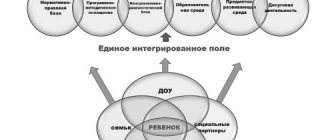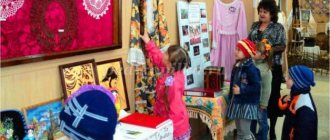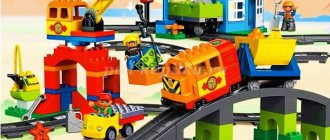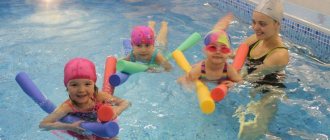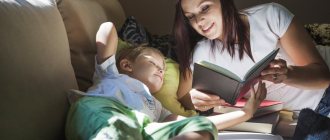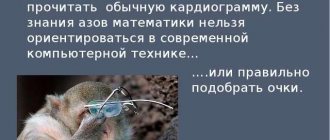Family club as a form of interaction with families of pupilsmaterial on the topic
Family club as an effective form of developing social partnership between teachers and parents of students
Preschool age is the most important stage in the development of personality, the period of initial socialization of the child, introducing him to the world of cultural and universal values. The task of a preschool institution is to create conditions for each child to fully realize his potential, maintain and strengthen his physical and mental health.
The relatives surrounding the child are especially significant for him due to his biological and psychological dependence on them. It is the parents who, from the first days of the baby’s life, create that unique joint atmosphere in which he lives and develops. Children's behavior and parents' behavior are interdependent; A psychologically comfortable environment contributes to the harmonious development of the individual and creates a sense of security and safety in the child.
It is in the family that the child receives the direction in life that determines his destiny. Therefore, it is very important that this direction be correct, so that the vectors of efforts of teachers and parents coincide. Otherwise, the child, finding himself in one situation or another, will be forced to lead a “double life” and will obey different rules. Therefore, the basis of the relationship between teachers and parents should be maintaining a single line in the upbringing and education of children, this will allow the child to feel confident and protected. Interaction will allow timely identification, awareness and solution of child development problems, and will ensure deep connections between parenting adults and the child.
Creating a unified, pedagogically appropriate, comfortable environment is a necessary condition for the full physical, mental and social health of preschool children.
A psychologically comfortable environment, from our point of view, must meet the following conditions:
— presence of family values and traditions;
- interesting joint activities of all family members;
— attention and respect for the interests, needs and desires of each family member;
— tolerance;
- mutual assistance and care for each other;
— satisfaction of vital physiological needs;
- opportunity for personal growth.
Many years of experience in our teaching activities have shown that such forms of work as traditional parent-teacher meetings, consultations, and information stands are not effective enough. In order to interest parents, involve them in the educational process, and increase their pedagogical competence, other active forms of cooperation are needed. Parents often lack practical knowledge and skills in communicating with their own children; they underestimate the importance of positive emotional well-being in the development of the child. But along with this, modern parents have a desire to learn all this.
All of the above leads to the need to search for new approaches and forms of cooperation between teachers and psychologists with the families of pupils.
One of the effective forms of cooperation between preschool teachers and families is the Family Club.
In the “Knowledge” group (MBDOU No. 264, Krasnoyarsk), the “Preschooler” family club has been operating for two years. The family club was created with the goal of optimizing parent-child relationships by providing parents with a variety of professional assistance.
The main focus of the Family Club’s work in the current academic year has been the creation of a unified psychologically comfortable environment in the family and educational institution.
The family club allows teachers, psychologists, and preschool education specialists to successfully solve the following problems:
- creating an atmosphere of community of interests, emotional mutual support and mutual insight into each other’s problems;
- establishing partnerships with the family of each child;
- introduction of active forms of interaction;
- activating and enriching the educational skills of parents, increasing the psychological and pedagogical culture of raising adults;
Several stages of development of social partnership have been identified:
Stage I – Organizational
Stage II - Practical
Stage III – Reflective
At the first stage, psychological and pedagogical monitoring of each family was carried out, information about the family was collected through observation, conversations, questionnaires, and family visits.
Based on the data received, educators and an educational psychologist issued a “Family Passport”, which contains the following data:
• Social status of the family (employees, workers, etc.)
• Family composition
• forms of family relationships (diagnosis of the style of family relationships - authoritarian, democratic, liberal and permissive by questionnaire, interview.) Parental attitude test (A.Ya. Varga, V.V. Stolin) / Psychological tests. Ed. A.A. Karelin - M., 2001, T.2., P.144-152.
• maternal status
• attitude towards the educational institution, etc.
Having studied pedagogical attitudes, we identified differentiated groups of parents who differ in their needs, attitudes towards raising a child in a preschool educational institution and the family.
Typical parent groups:
I Parents who take an active part in raising a child in a preschool educational institution and in the family;
II Parents who are interested in the child’s life in a preschool educational institution, but do not take part in it;
III “Indifferent” to the work of the kindergarten, showing no interest in the life of the child in the children's team.
In addition, we identified a group of parents who are overly protective of their child, constantly showing concern for the child, and demanding close attention and special treatment from the teacher towards their child. Based on the data obtained, a work plan for the Family Club was drawn up, current topics and forms of interaction were identified.
II Practical stage.
Meetings in the Family Club are organized 1-2 times a month. They take place in a warm, friendly atmosphere that promotes emancipation and mutual enrichment of participants.
Together with the parents, grandparents, sisters and brothers, preschool specialists, guest doctors, librarians, etc. come. The topics of such meetings are varied, they meet the interests and requests of the parents, the form of the meeting is suggested by the psychologist and teachers of the group.
At the initiative of the parents, the psychologist organized a discussion on the topic “Crime” and punishment.”
The purpose of the meeting is to develop in adults behavioral skills related to the choice of form of punishment in the family.
A preliminary survey of children was conducted during which the following questions were asked:
— How are you punished at home and in kindergarten?
- Why are you being punished?
- How do you feel when you are punished?
—Will you punish your children when you become an adult?
Subsequently, parents were presented with a video on the topic “Children's perspective on Crime and Punishment.”
Subsequently, parents were asked questions for discussion:
- Is it possible to raise a child without punishment?
- Why do you punish your child in your family?
- How does a child behave when he is punished?
- What punishments are excluded in your family?
- How do you discipline your child?
- Do you discipline your child alone or do you make a joint decision (with other family members?)
In addition, the topic of the dialogue was the most common conflict situations in the family.
In conclusion, parents were offered the interactive game “Flower Meadow”; On the flower, the parents wrote about what they learned new during the discussion.
Family holidays are the most attractive for parents. Parents are not only spectators, but also active participants in the action. They prepare attributes and costumes, perform roles, play, dance and sing with the children. Holidays - “Dad, Mom, I am a sports family”, “Grandma, Granny, how I love you!”, “Let’s live cheerfully” (April Fool’s Day) - have become traditional in the Znayki group. Here children and parents not only have fun, but also gain invaluable experience of communication in a variety of activities. Children develop a sense of pride in their parents, security, and self-confidence, because mom and dad are nearby.
Joint productive activities are also relevant for children and adults. In the “Father Frost’s Workshop,” parents and children made toys that were subsequently decorated with Christmas trees in the neighborhood; in the creative studio “Masterilka” - postcards for dads and moms (we managed to attract dads too!)
In the process of joint creativity, children and adults learn to negotiate, hear each other, help and jointly achieve results. And most importantly, enjoy physical and emotional intimacy. In a situation where parents are overloaded with work and household chores and pay little attention to the child, this is extremely important.
One of the effective modern forms of cooperation between teachers and parents is interactive games. Their use allows you to create a comfortable environment of interaction, where each participant feels successful and intellectually prosperous. Parents turn from spectators and listeners into active participants.
For example, during a meeting on the topic “Lessons in Education,” games were used that enriched educational skills and helped parents develop a new perspective on the child and the process of his upbringing.
The game “Candle of Wishes” involved developing in parents the ability to predict the outcome of raising a child.
Parents were asked to stand in circles, passing a candle to each other, and name the most important quality that they would like to cultivate in their child.
The game “Compliments” develops the ability to communicate and notice good qualities in people.
Sitting in a circle, everyone joins hands. Looking your neighbor in the eyes, you need to say a few kind words to him, praise him for something. The recipient of the compliment nods his head and says: “Thank you, I’m very pleased!” He then compliments his neighbor. The exercise is carried out in a circle.
The goal of the game “Tender Chain” is to develop tactile sensitivity and communication skills in adults and children. Children and parents stand in a circle. The organizer of the game gives the task: “Stroke your neighbor’s hand,” “Tenderly stroke your neighbor’s head.”
As part of the Family Club, parents share their experiences of family education. For the “Let’s Look Through the Family Album” meeting, parents prepared photo reports about the family, family traditions, and connections between generations.
In a fascinating way, they talked about the favorite activities of family members and types of joint recreation.
We made an attempt to revive a unique family tradition - joint evening reading. For this purpose, a librarian was invited to one of the meetings, a family quiz “In the World of Fairy Tales and Adventures” was held, and a presentation of the best examples of children's fiction was organized. And the group created a “Weekend Library for Adults and Children,” which is regularly updated and is in demand by parents and students.
The “Tea Festival” at the Family Club reminded parents of another lost tradition - joint family tea parties.
Children and their parents brewed herbal tea according to “grandmother’s” recipes and treated each other to homemade cakes.
A warm homely atmosphere was created, which is so necessary for the emotional development of the child.
Analyzing the experience of cooperation between teachers and parents, we argue that the Family Club is a modern and effective form of interaction.
III Reflective stage
The results of the activity are the following indicators:
• active involvement of parents in the educational process, high degree of trust by teachers and preschool specialists;
• acquisition by parents of the necessary knowledge and educational skills for full communication with children;
• changing parental attitudes, increasing the degree of confidence in their teaching capabilities;
• creation of a unified educational space in preschool educational institutions and families;
• uniting teachers and the majority of parents into a single team with common value-target guidelines and educational meanings.
From our point of view, the joint activities of teachers, parents and children within the Family Club make it possible to indirectly influence the creation of a psychologically comfortable environment for a child to stay in a preschool educational institution and family, which will have a positive impact on his physical and mental health.
Parents' club "Igralochka" in the early age group
Regulations on the parent club "Igralochka"
1. General Provisions
1.1 These regulations govern the activities of the parent club “Igralochka!” (hereinafter referred to as the Club, organized at the Municipal Budgetary Preschool Educational Institution “Kindergarten No. 43” in Syktyvkar).
1.2 The club was organized with the aim of creating conditions for interaction between children and adults through the organization of a single educational space of the preschool educational institution and the family of group No. 13 of the preschool educational institution.
1.3 The club carries out its activities in accordance with regulations in the field of education, the Charter of the preschool educational institution, and these regulations.
1.4 The club participants are parents (legal representatives) and students of group No. 13, teachers.
1.5 The club is an additional component of the educational process, where parents are involved in the system of joint interaction of the educational process of preschool educational institutions through various forms of work.
1.6 Purpose of the club: Creating conditions for interaction between children and adults through various forms of educational work.
1.7 Objectives of the club:
To interest parents in the development of joint play activities that ensure successful socialization and adaptation;
Expand parents’ ideas about forms of family leisure through various forms of joint activities;
Involving parents in active forms of joint activities with their children, through participation in joint theatrical performances in the Russian National Social Sciences, entertainment;
Development of fine motor skills through the organization of various joint activities with parents.
2. Main activities of the club
2.1 Providing consulting assistance to parents of children on problems with gaming activities.
2.2 Promoting the positive experience of family education of a healthy lifestyle.
2.3 Increasing the pedagogical knowledge of parents.
2.4 Popularization of the activities of preschool educational institutions.
2.5 Formation of parent-child relationships through joint gaming activities.
3. Organization of club activities
3.1 The work of the club is carried out on the basis of preschool educational institutions from September to May 2020.
3.2 The club is visited by parents (legal representatives) of pupils of group No. 13 “Sun”.
3.3 The composition of parents (legal representatives) - club participants may change depending on their needs for activities and interests.
3.4 Planning of the Club’s work is carried out taking into account the interests of parents (legal representatives). The work plan is approved at the first meeting of the club.
3.5 Forms of organizing the work of the Club: round tables, psychological trainings, solving pedagogical situations, integrated joint classes, discussion of the experience of family education, video viewings of materials on organizing the lives of children in preschool educational institutions. The first part of the club is theory, the second part is practice (game).
4. Rights and obligations of club members.
4.1 Parents (legal representatives) have the right:
— to receive qualified advice on raising a child;
- to receive practical assistance in organizing activities with children at home;
— to express one’s own opinion and share experiences in raising children.
4.2 The preschool educational institution has the right:
- to study and disseminate positive experiences of family education;
— making adjustments to the Club’s work plan depending on emerging problems, interests and requests of parents (legal representatives).
4.3 Parents are required to comply with ethical standards.
4.4 The preschool educational institution is obliged to:
— organize the work of the Club in accordance with the plan approved by the head of the preschool educational institution and taking into account the interests and needs of parents (legal representatives);
— provide qualified advisory and practical assistance to parents (legal representatives).
5. Documentation
5.1 The club operates according to the plan approved at the beginning of the school year.
5.2 Events of the parent club “Igralochka” are recorded in the following form:
– date of the event;
– theme of the event;
– number of parents (legal representatives) present;
– signature of teachers.
6.Evaluation stage
The effectiveness of the work of this club can be judged by the results of the number of visitors and the activation of parents at the meeting of the club - sociometry club.
Long-term work plan for the parent club “Igralochka!”
for the 2019-2020 academic year.
| № | Month | Events | Responsible |
| 1. | September | Opening of the “Igralochka” club - Approval of the work plan Goal: to interest parents in visiting the club. -Draw and approve a work plan. -Parent survey: “My baby’s free time” -Tea party “Let’s get to know each other” -Exhibition of games in a group. -Excursion in a group to game centers. | Teachers: Garayeva E.N. |
| 2. | October | Creative workshop “Crazy Hands” -Parent meeting: “The importance of play activities for the comprehensive development of preschool children.” Goal: to reveal the importance of games in the development of a child. -Master class (on salt dough). Goal: Acquaintance with the capabilities of salt dough and its use in the process of artistic creativity (modeling). — Consultation on the topic: “Developing fingers.” -Finger games “Gingerbread” -Booklets for parents on the topic: “Organizing games with children at home.” -Selection of exercises for finger gymnastics with children at home. | Teachers: Garayeva E.N. |
| 3. | November | Game library -Non-traditional physical education activity with a newspaper -Outdoor game “Wolves and Hares” -Consultation on the topic: “Outdoor games as a way to strengthen and develop children.” -Booklets for parents on the topic: “Family-scale games”, “Selection of outdoor games on the street and at home” | Teachers: Garayeva E.N. |
| 4. | December | "Visiting a fairy tale" Goal: promote family cohesion. To foster the creative initiative of parents in theatrical activities. -Consultation for parents: “Home toy library for educational games with children | Teachers: Garayeva E.N. |
| 5. | January | Holidays "Winter fun" Goal: creating motivation for active participation in entertainment, promoting family cohesion, developing children’s creative abilities, and developing cooperation skills. -Construction of snow buildings on the site. -Publishing the wall newspaper “Winter Fun with the Family.” Goal: Raising parental awareness. -Consultation for parents: “How to spend the winter holidays with your family?” -Booklets for parents on the topic: “Joint games with parents on a walk” | Teachers: Garayeva E.N. |
| 6. | February | Country "Sportlandia" Goal: to develop the needs for active motor activity. Develop a positive attitude towards playing together and a healthy lifestyle. -Entertainment -Consultation for parents -Wall newspaper release | Teachers: Garayeva E.N. |
| 7. | March | Musical chest — Consultation on the topic: “Music in a child’s life” — Musical games “Loud-quiet”, “Applause” - Booklets for parents on the topic: “Musical games with a child at home” — Master class on making musical instruments from waste material | Teachers: Garayeva E.N. |
| 8. | April | Creative workshop - Consultation on the topic: “The importance of drawing in a child’s life” - Introducing parents to non-traditional drawing techniques - Team work with a combination of various drawing techniques “Big friendly family” - Booklet for parents on the topic: “Draw with me, Mom” | Teachers: Garayeva E.N. |
| 9. | May | Spring is sweeping the planet! - Action “Take care of primroses!”: Making a collage “Tulips in a vase” Creation of an album “Primroses” Final meeting of the club: - Summing up the work done - Preparation of a photo report of joint events. Setting goals for the future. Rewarding participants in the parent club. -Parents meeting “Our successes” -Booklet for parents “Oh, what color is summer?!” -Consultations for parents on the topic of summer. | Teachers: Garayeva E.N. |
Parents' club is an unconventional form of effective interaction between teachers and parents in preschool educational institutions
Plotnikova Anna Evgenievna
teacher
"Kindergarten No. 22"
Kamensk-Uralsky
Parents' club is an unconventional form of effective interaction between teachers and parents in preschool educational institutions
Brief description: experience in creating a family parent club in a preschool institution (group) for effective interaction with parents and an approximate annual work plan for the club will be interesting and useful for preschool teachers.
The family and kindergarten are the main institutions for raising a child. Public and family education of children should be a unified system of both educational and educational practices, implemented jointly by all participants in the educational process. The main goals should be: the formation of a moral, fully developed personality, ready for life in modern society. And every modern teacher faces the task of organizing effective interaction with the families of pupils, actively involving parents in the joint development of children in preschool educational institutions and families, developing uniform requirements, goals and objectives for the development of preschool children.
In this regard, each preschool educational institution uses different forms of work with families. Traditional and non-traditional forms of interaction with family can be distinguished. Traditional forms include:
- parent meetings,
- conversations, visiting families,
- joint holidays and entertainment,
- consultations,
- design of stands, travel folders with information for parents,
- exhibitions of family works, photo exhibitions,
- open days.
To non-traditional:
- conducting master classes,
- joint walks, entertainment, excursions on holidays and weekends,
- round tables, issues of family and group newspapers and posters,
- presentations
- video competitions,
- joint ICT presentations,
- production of brochures, leaflets, booklets,
- exhibitions of family heirlooms,
- creation and operation of a family club.
Today I want to share my experience of creating a family club in a kindergarten group. This is a wonderful opportunity to organize the most effective interaction between teachers and parents in a preschool institution.
The purpose of the family club: to create a unified educational process in the preschool educational institution and the family, the active involvement of parents in all activities of the kindergarten and group, effective interaction between adults and children.
Objectives of the Club:
- providing advisory, psychological and pedagogical education and assistance to parents,
- improving the pedagogical culture of parents,
- attracting parents to participate in the life of the preschool educational institution,
- creating conditions for full communication and cooperation between parents and teachers (exchange of opinions and experiences in family education).
Important conditions for the club to operate:
- making a joint decision to create a club at the first parent meeting,
- to captivate parents with an interesting direction (topic) for a year,
- determining the frequency of meetings (monthly, quarterly),
- drawing up a club work plan,
- meetings are held jointly with children and parents with the involvement of specialists.
I offer you a sample plan for the work of a club in a preschool institution in accordance with the annual / project theme.
Work plan of the family club “We are together”
Annual theme: “Getting to know your hometown”
| Deadlines | Event | Target |
| September | Family survey | Identifying the knowledge and ideas of parents and children about their hometown, its history, and the need for work in this area |
| First meeting “What do we know about our small homeland?” | To interest parents in the moral and patriotic education of children, creating conditions for joint acquaintance of children with their hometown | |
| October | Booklets on the most pressing requests of parents: “Family and computer”, “Child safety on the street”, “Reading together about our hometown” | Formation of parents' need to receive professional pedagogical assistance. |
| Photo exhibition “Walk through city attractions with mom (dad)” | Getting to know the sights of your hometown. make parents want to show their children historical places and monuments. | |
| November | Second meeting Creative workshop “Family Traditions” | Interaction between preschool educational institutions and families through familiarization with folk traditions of families |
| Mini-museum: “Craft Workshop” | Introduce children to the craft of their hometown. | |
| December | Preparation, rehearsals, participation in the New Year holiday | Invite parents to participate in the holiday in various roles of heroes |
| Competitions: "New Year's toy for the city tree" “New Year’s card “City Tale” "New Year's windows" | Joint participation in parent-child competitions | |
| Within six months | Excursions: Fire Department Museum Houses of Culture The city's attractions | Invite parents to go on city excursions together |
| January | Booklet for parents “What to tell and read to children about their hometown; Author’s poems about the city” | Recommendations from parents for introducing children to their small homeland. Introduce original poems by urban poets. |
| January | Mini-museum “My City” | Involve parents in joint creativity with children, creating models of city attractions from any materials, designing a mini-museum in a group |
| 3 meeting "Meeting interesting people" | Introduce city writers, leaders of creative and dance groups, famous people of the city | |
| February | Promotion "Igroteka" | Attracting parents' attention to children's play as an activity |
| Military-patriotic game "Zarnichka" | Invite fathers and grandfathers to participate in the dawn. | |
| Photo exhibition “Beloved Dad, Grandfather” | ||
| March | Spring holiday "March 8" | Involve parents in the preparation and holding of the spring holiday, decoration (Russian birch tree, Russian hut) |
| Photo exhibition “Walk with Mom in Hometown” | Invite parents to spend time together with their children | |
| April | 4 meeting Excursion - quest “Streets named after WWII heroes. Monuments to WWII participants" | Involve parents in a joint excursion to memorable places and jointly develop a route. |
| Book of Memory “Great feat through the eyes of children” | Create a Book of Memory about the participants of the Second World War. Introduce children to the history of grandfathers and great-grandfathers who participated in the Second World War. | |
| May | 5 meeting Creative living room "Living as one family" | Creating a social – pedagogical space for creative interaction between children and adults |
| Competition “Postcard to a Veteran” | Uniting children and adults during joint creativity. Foster a sense of respect for those who fought. | |
| Joint window decoration for May 1st and 9th | Creating a festive mood in the group through joint efforts and creativity | |
| During a year | Excursions to mom and dad's work | Invite parents to become familiar with enterprises and professions in their hometown |
| During a year | 6 meeting Participation in regional family competitions | Increasing the role of the family and the institution of family traditions |
| During a year | Weekend program (outing into nature, ski competitions, etc.) | Organization of joint leisure time for children and parents |
In conclusion: the influence of family on raising children is enormous. And success in the unified and integral education of the personality of each child depends on the organization of work with parents, their inclusion and involvement in the educational process, and effective interaction.
Interest club at preschool educational institution. Work plan
Interest club in kindergarten
Author: Olga Aleksandrovna Berdnikova, teacher, MBDOU “CRR-d/s “Rosinka”, Abakan, Republic of Khakassia
Interest club - as one of the forms of cooperation between teachers, parents and children
(for parents and children of the senior, preparatory group for school) The process of becoming a full-fledged personality takes place under the influence of various factors, the first and most important of which is the family. This is an environment that incorporates a wide range of parameters that influence a person’s mental development, the capabilities and nature of his personal and social functioning, and the possibilities of self-realization. A kindergarten is the first non-family social institution, the first educational institution with which the family comes into contact for the purpose of raising and educating the child, preparing him for life in society. We, specialists of a preschool institution, provided that we competently structure interaction with the family, have a unique opportunity to systematically communicate with the family, close contact with parents, which opens up the broadest opportunities for organizing joint work in the triad “family - child - kindergarten”. Regardless of what form of interaction with the family we choose, it is important to consider that awareness of oneself in the new status of a parent is accompanied by a revision of life principles, value systems, and aspirations. Therefore, it is necessary that a competent teacher be next to the parent, on whose competent help he could count in any situation. Our teaching staff has constantly set and is setting a goal: to look for new forms of interaction, fill them with relevant content and present it in such a way that parents want to use it. Today it is impossible to limit ourselves only to the promotion of pedagogical knowledge, in which parents are only passive participants. That is why, as one of the main forms of work with the families of our students, we have chosen such an association of parents, children and teachers as a parent-child club. The members of the club are all interested parents of our students, preschool teachers and children. The topics of meetings in the club are chosen taking into account the characteristics and needs of families based on the problems that arise during the educational process. Each parent can choose a seminar, training, joint activity - everything that is important and interesting for him to attend.
Long-term work plan for the club “Lovers of Correct Speech”
Goal: to unite the efforts of teachers and parents in developing children’s correct spoken language. Objectives: - to acquaint parents with the work of preschool educational institutions on the development of children’s speech; — develop parents’ ideas about the methods and forms of children’s speech development; — provide methodological assistance to parents in the development of children’s correct speech. The first year of classes at the club serves to establish contact between parents and preschool specialists; it is expected that in the course of the work, group members will become familiar with the basics of correct speech.
Long-term club work plan 1 year
September
The topic of the meeting is “How our word will respond.” Contents. The word has always had power. The ancients said that the doctor has three medicines - herbs, minerals and the word. Speech performs important functions in the development of a child and must be literate, correct, and beautiful. Speech therapist's recommendations Fragment of a speech therapist's lesson on speech sound culture
December
Topic of the meeting: “Lessons in politeness and beauty” Good manners, politeness, beauty are closely related to the moral education of a child Recommendations of a teacher-psychologist
February
Topic of the meeting: “Raising a child using the native language and folk art” Contents. The possibilities of art in the development of children's speech. The age of 5-6 years is the age of development of imagination, which is the basis of creativity. Recommendations from a music director, teacher of additional education on art activities
May
Topic of the meeting: “Entertainment “Journey to the Land of Games” Contents: Games with children and parents aimed at developing speech
Long-term plan for the club's work, year 2
The second year of classes is a joint work of teachers, children and parents. At this stage, parents can put the acquired knowledge into practice in games and exercises with their children.
September
Topic of the meeting: “We play wherever possible” Contents. Methodological assistance to parents in organizing children's games
December
Topic of the meeting: “On the importance and benefits of games with words” Contents. Preparing children for school, reinforcing correct pronunciation in speech. The development of a child’s vocabulary is a defining part of speech culture
February
Topic of the meeting: “Movement and speech” Contents. Properly organized physical education using elements of kinesiology promotes the mental development of children, as favorable conditions are created for the normal functioning of the nervous system
May
Celebration Summing up the club's work
We recommend watching:
Parent meeting on traffic rules in the preparatory group Creative workshop in kindergarten “Making laboratory materials with your own hands” Lesson with parents in kindergarten. Abstract Literary quiz on fairy tales for kindergarten
Similar articles:
Plan of interaction with families of children of the middle group of general developmental orientation
Methodological recommendations for drawing up an individual development program
